The association of Women fighting against HIV/AIDS and Malaria-SFBLSP Burundi celebrated on 28 September the Global Day of Action for Access to Safe and Legal Abortion. Alarming figures reflect clandestine abortion despite several consequences.
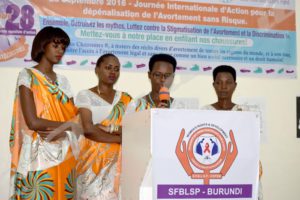
Esperance Ntirampeba: “Banning backstreet abortion is a concern to everybody”
“We have conducted a sample investigation in four provinces including Bubanza, Cibitoke, Bujumbura and Bujumbura city and it reveals that the figures increase year after year,” said Jean Nkeshimana, project coordinator in SFBLSP. He says Bujumbura city comes first among the four provinces where backstreet abortion is carried out.
“Figures rose from 158 cases in 2014 to 286 cases in August 2016 in Bujumbura city while they rose from 195 cases in 2014 to 229 cases in 2016 in Cibitoke western province”, says Nkeshimana.
According to SFBLSB coordinator, the figures come from different health centers and the targeted groups are young girls and women, victims of incest and sexual abuse. “These figures showed us that the abortion is a reality and reflects a need for solutions given its bad consequences as it is done illegally. Then, using contraceptive methods is a need for young girls and women to avoid having unwanted pregnancies even if religious confessions remain a huge barrier”, he noted.
In addition, there is a need for action to get access to safe and legal abortion so that consequences should be restricted for some cases. “We are very much concerned about the increasing number of clandestine abortion performed in different localities. Burundi government has to adopt laws concerning access to safe and legal abortion following cases of sexual abuse, incest or when the pregnancy is a serious danger for a woman’s life”, explained Esperance Ntirampeba, the chairwoman of SFBLSB. She says it is hard to have two doctors who will permit legal abortion as it is stipulated in the Burundi penal code for a pregnant woman whose life is in danger.
During the discussion, attendees’ opinions diverged. For Monique Rwasa from the collective associations that defend women’s rights-CAFOB, it is impossible to legalize abortion. “I am astonished to hear that there are people who support abortion! This means they will also plead for homosexuality. If those women are pregnant, they shall give birth instead of killing innocent kids”, she said.
Sandrine Degedege, a psychologist, says abortion is an interesting topic that needs a serious debate for people to understand more about it. “With the main objective to maintain parental balance and avoid the social stigma attached to abortion, there is a need to legalize the latter given various consequences that follow unwanted pregnancies”, she says.
However, lawyer Athanase Ntikazohera indicated that the Burundi penal code stipulates that abortion is illegal and is severely punished.
“As the Maputo protocol which promotes women’s rights has not yet been ratified by the Burundian government, abortion will always be strictly punished,” he said.

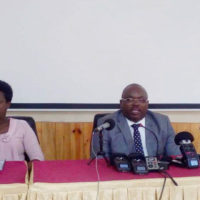

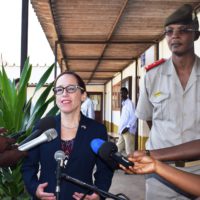
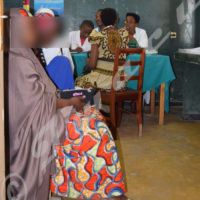
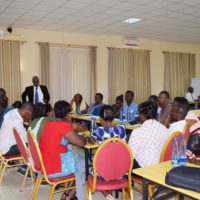













 IWACU Open Data
IWACU Open Data

